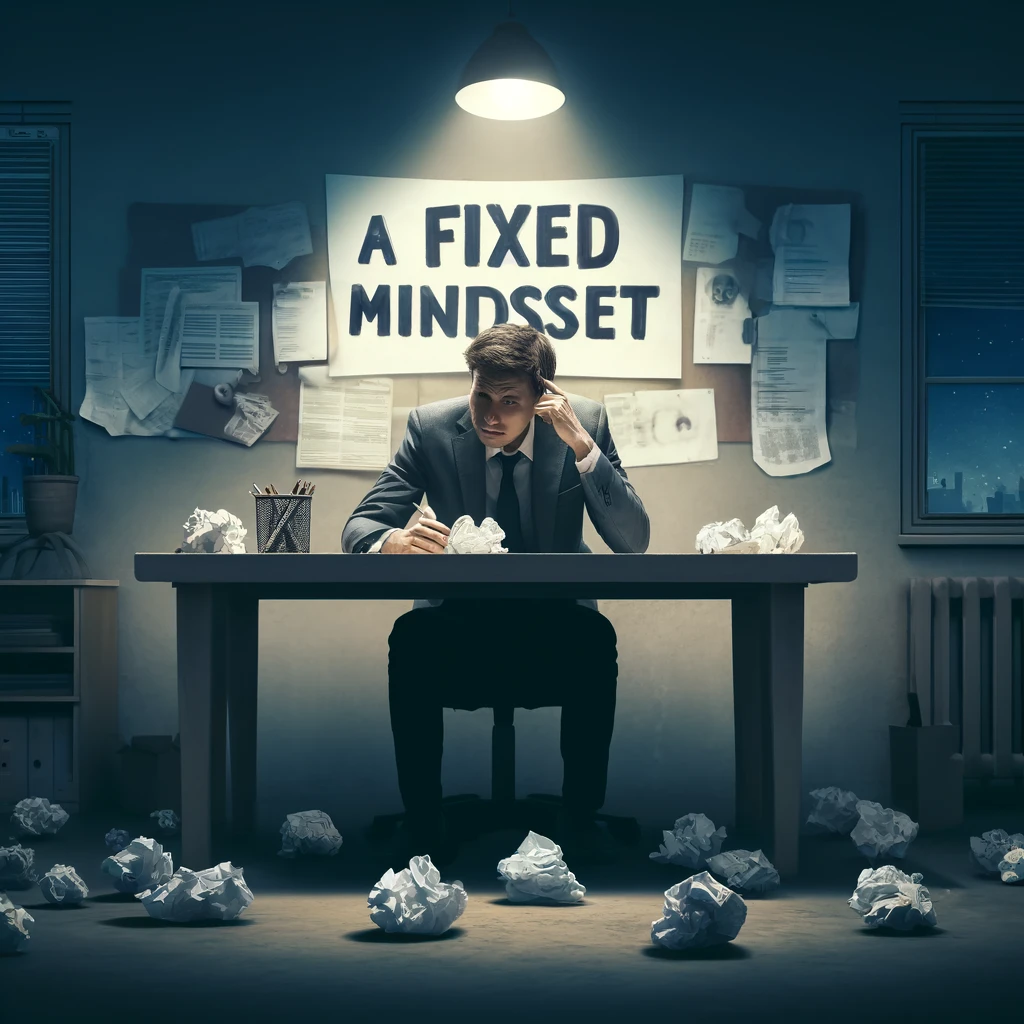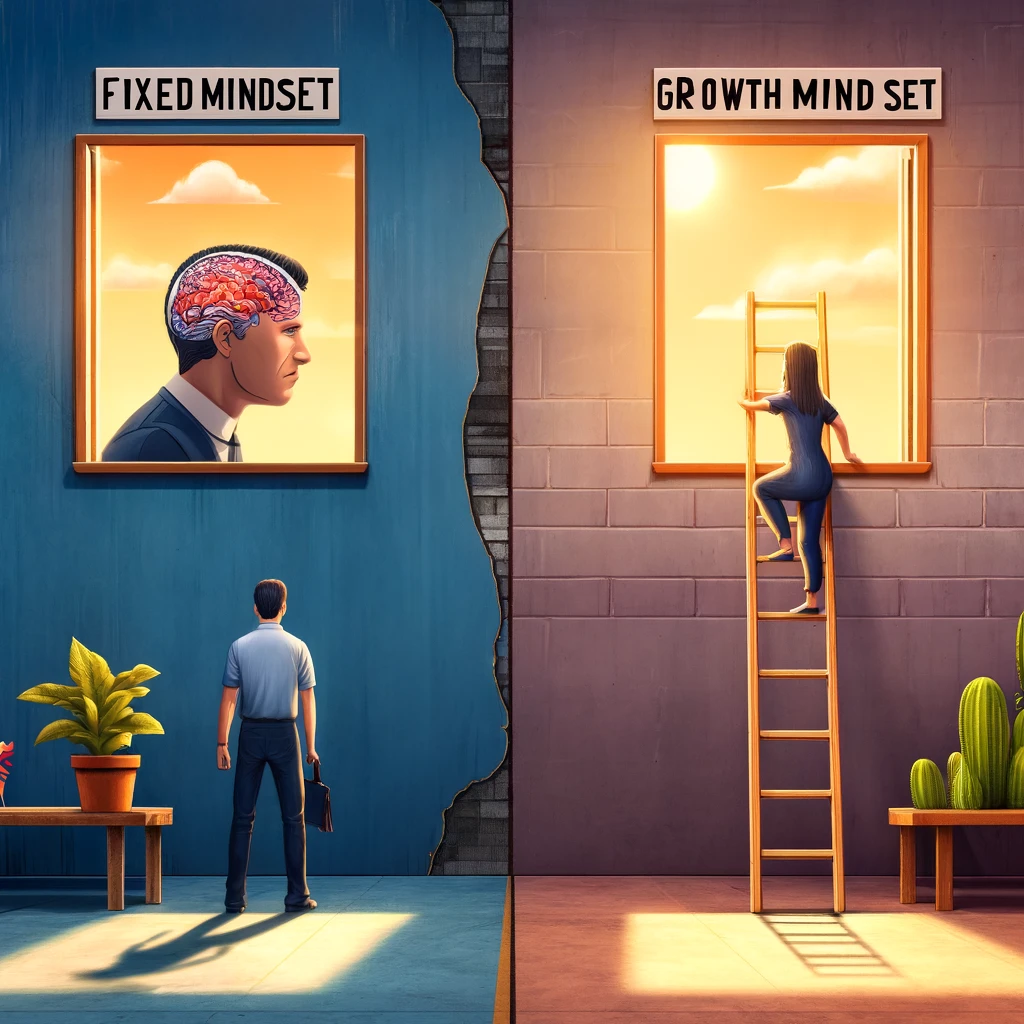A fixed mindset, a term popularized by psychologist Carol Dweck, refers to the belief that our abilities, intelligence, and talents are static traits that we cannot change in any meaningful way. This mindset caps our potential and hinders our ability to learn from our experiences and grow. In contrast, embracing a growth mindset can open doors to new opportunities, fostering resilience crucial for overcoming challenges and achieving success.
This article explores the concept of a fixed mindset, its implications, and practical strategies for transitioning towards a more flexible and growth-oriented perspective. By understanding and addressing the limitations of a fixed mindset, we can unlock a world of possibilities, breaking free from the mental bonds that restrict our true potential.
Read More: What is the New Mindset: A Guide to Cultivating Positive Change
Understanding the Fixed Mindset: Exploring the definition and characteristics of a fixed mindset.
A fixed mindset is not just a minor personality quirk; it is a pervasive approach to life that significantly influences how individuals perceive themselves and their capabilities. At the core of the fixed mindset is the belief that intelligence, talent, and other abilities are innate and unchangeable. People with a fixed mindset tend to assume that success results from these inherent qualities rather than effort, which leads them to shy away from challenges and avoid failure at all costs.
Characteristics of a Fixed Mindset
Individuals with a fixed mindset often display several key characteristics:
Avoidance of Challenges: Because they believe their capabilities are fixed, they prefer to stick to tasks where they know they can succeed, avoiding situations where they might fail and thus “prove” their limitations.
Fear of Failure: Failure is seen not as an opportunity to learn but as a negative reflection of their inherent abilities. This fear can paralyze decision-making and stunt growth.
Resistance to Feedback: Feedback, especially criticism, is often taken personally rather than as a tool for improvement. This can lead to resistance against advice and coaching.
Threatened by Others’ Success: The success of others can feel like a direct threat, leading to feelings of insecurity and competitiveness rather than inspiration or learning from others.
The Origins of a Fixed Mindset
The roots of a fixed mindset can often be traced back to early life experiences. Educational systems and parenting styles emphasizing innate ability over effort can foster a fixed mindset. For example, praising a child solely for their intelligence (“You’re so smart!”) rather than their effort (“You worked really hard on this!”) can reinforce the idea that their qualities are fixed.
Understanding these traits and their origins is the first step toward cultivating a more adaptive and growth-oriented approach to challenges and learning. Recognizing a fixed mindset in oneself can be challenging but is essential for initiating personal growth and change.

Consequences of a Fixed Mindset: How it affects personal and professional growth.
Adopting a fixed mindset does more than just shape personal perceptions; it has tangible, often detrimental effects on various aspects of one’s life. Understanding these consequences can help illuminate why striving for a growth mindset is crucial.
Impact on Personal Growth
With a fixed mindset, individuals often see their skills and intelligence as static, discouraging learning and adaptation. This outlook can lead to a stagnant personal development trajectory where new skills are seldom acquired and challenges are avoided. Over time, this can result in a lack of fulfillment and a sense that one’s potential is unfulfilled.
Effects on Professional Advancement
In the professional realm, a fixed mindset can be particularly limiting. It might manifest as reluctance to take on new responsibilities or roles that require learning. Employees might avoid seeking promotions or engaging in innovative projects due to fear of failure or exposure as “not good enough.” This not only hampers individual career growth but can also impede organizational progress.
Relationships and Social Interactions
Socially, a fixed mindset can lead to strained relationships. Individuals may struggle with envy or insecurity, especially in the face of others’ successes, which can poison personal and professional relationships. Furthermore, a fixed mindset can prevent people from opening up to constructive criticism, which is crucial for personal and relational growth.
Psychological Well-being
The psychological impact of a fixed mindset should not be underestimated. It often leads to higher stress levels and anxiety, as individuals may constantly feel the pressure to prove themselves. This can lead to burnout and mental health declines, especially if individuals feel trapped by their perceived limitations.
Broader Societal Impact
On a larger scale, when many individuals in a society hold a fixed mindset, it can lead to a culture that resists change and innovation. This is detrimental in a global economy where adaptability and continuous improvement are keys to survival and prosperity.
Recognizing these consequences is vital as it underscores the importance of nurturing a growth mindset, not just for individual achievement but for the well-being and advancement of society.

Comparative Analysis: Fixed Mindset vs. Growth Mindset.
Understanding the differences between a fixed and a growth mindset is crucial for recognizing the benefits of adopting the latter. Here’s a comparative analysis highlighting the key distinctions and the impact each mindset has on behavior, learning, and overall success.
Key Differences
Response to Challenges: Those with a growth mindset thrive on challenges and view them as opportunities to learn and grow, whereas individuals with a fixed mindset often avoid challenges, fearing failure.
Effort Perception: In a growth mindset, effort is seen as a path to mastery and success. Conversely, those with a fixed mindset may view effort as futile if they believe their abilities are fixed and cannot be developed.
Feedback Reception: Individuals with a growth mindset welcome constructive feedback as a valuable source of learning and direction for improvement. On the other hand, those with a fixed mindset might ignore feedback or take it personally because it threatens their self-concept.
Success of Others: A growth mindset allows individuals to find inspiration in others’ success and learn from it. In contrast, a fixed mindset can lead to feelings of threat and insecurity when others succeed.
Impact on Learning and Development
A fixed mindset can significantly hamper learning and personal development. It promotes a fear of making mistakes, thus avoiding new experiences and opportunities. A growth mindset, however, cultivates a love for learning and an appetite for the challenges that foster personal and professional growth.
Cultivating a Growth Mindset
Transitioning from a fixed to a growth mindset involves changing fundamental beliefs about abilities and potential. It requires consistent effort and dedication to self-improvement and embracing challenges as stepping stones rather than stumbling blocks.
Understanding these differences highlights the limitations of a fixed mindset and emphasizes the expansive and liberating nature of a growth mindset. By fostering a growth-oriented approach, individuals can unlock their full potential and achieve greater success.

Strategies to Overcome a Fixed Mindset: Practical steps and techniques.
Shifting from a fixed to a growth mindset isn’t merely about changing how one thinks; it’s about adopting new behaviors that foster flexibility, learning, and resilience. Here are practical strategies anyone can use to begin this transformative journey.
Embrace Challenges
Embracing challenges is fundamental to developing a growth mindset. Instead of avoiding difficult tasks for fear of failure, see them as opportunities to improve and learn. Each challenge is a step towards greater competence and confidence.
Cultivate Curiosity
Curiosity drives the desire to explore and understand new things, which is at the heart of a growth mindset. Ask questions, seek new skills, and remain open to new experiences. This not only enhances knowledge but also builds adaptability.
Value Effort Over Perfection
Recognize that effort is more critical than perfection. Celebrating small wins and efforts toward goals can encourage persistence and decrease the fear of failure. Understand that mastery comes through continuous effort and practice.
Learn from Criticism
Constructive criticism is a valuable tool for improvement. Learn to receive feedback positively and use it as a roadmap for development. This perspective turns potential setbacks into helpful insights that propel personal growth.
Inspire and Be Inspired by Others
Surround yourself with people who embody a growth mindset. Learning from their attitudes and responses to challenges can provide motivation and practical examples of how to handle similar situations in your life.
Keep a Journal
Documenting thoughts and progress in a journal can help reinforce a growth mindset. Reflect on daily learning and challenges overcome, and plan for future growth. This reflective practice ensures consistent awareness and commitment to developing new habits.
Adopting these strategies requires persistence and patience, but the rewards of cultivating a growth mindset are immense and far-reaching, affecting every aspect of life.







